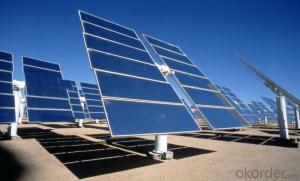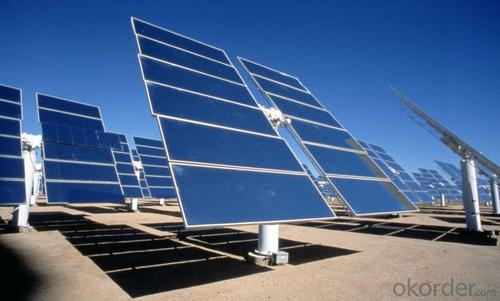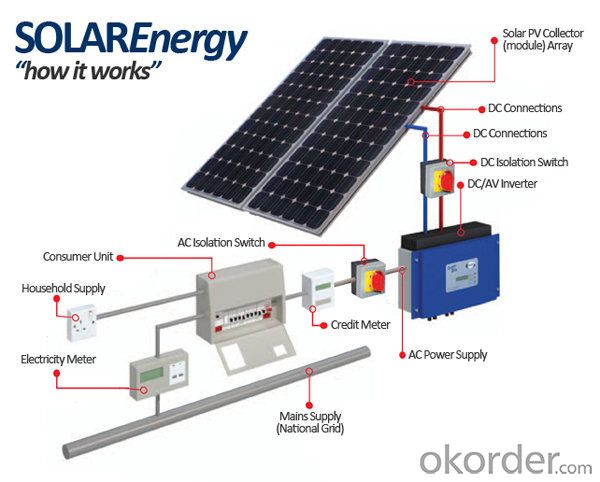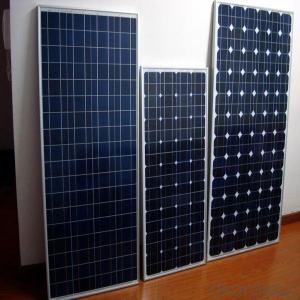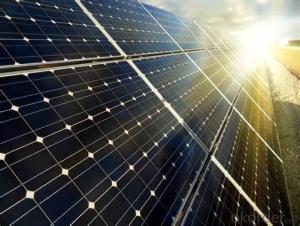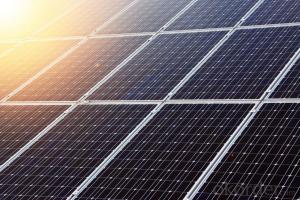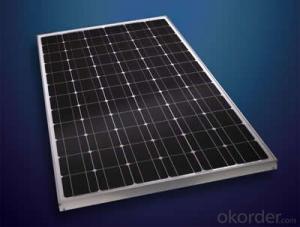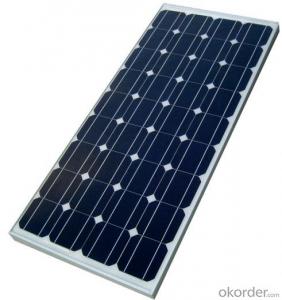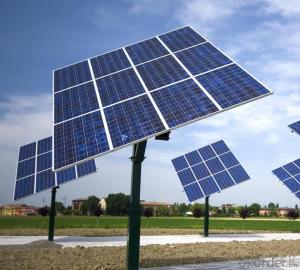Lunar Solar Panels - 290w Poly Solar Module with High Efficiency
- Loading Port:
- Tianjin
- Payment Terms:
- TT OR LC
- Min Order Qty:
- 1 watt
- Supply Capability:
- 100000 watt/month
OKorder Service Pledge
OKorder Financial Service
You Might Also Like
Specification
Product Description:
1.Structure of Solar Module Description
CNBM Solar's photovoltaic module is designed for designed for large electrical power requirement. It is the optimal choice for both on-grid and off-grid power systems. CNBM Solar offers high performance of power per square foot of solar array.
2.Main Features of the Solar Module
Solar Cell: High efficency crystalline solar cell. Even if under the weak light, the solar module can produce maximum power output.
Tempered glass: Anti-reflecting coating and high transmission rate glass increase the power output and mechanical strength of solar module.
EVA and TPT: Using high quality EVA and TPT to prevent destroying and water.
Strong aluminum frames to strengthen the load hold and to stand against high wind.
Junction box: Multi function junction box with water proof.
Long lifetime: ≥25 years; Less power decrease.
Good performance of preventing from atrocious weather such as wind and hails.
Resisting moisture and etching effectively, not effected by geology.
The certificate issued by international authority: UL, TUV, IEC, VDE, CE.
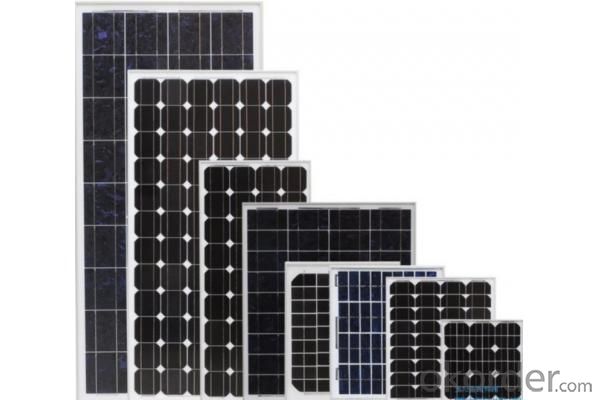
Solar panel working process
In addition to being the ultimate source of all life on earth, the sun is an infinitely renewable, completely pollution-free source of electricity. Instead of burning fossil fuels dug up from the ground in a big power plant – a very 19th century, industrial age approach, when you think about it – solar panels convert sunlight directly into electricity, with no harmful emissions.
The basic unit of a solar panel is a solar cell, which usually consists of one or two layers of silicon-based semiconductor wafers. When struck by the photons in sunlight, the solar cell generates an electrical charge due to the "photovoltaic effect" – which is a pretty good name, since it produces voltage from photons. The flow of these electrons moves in a steady electrical current from one side of the cell to the other.
Dozens of these PV cells are packaged together into solar modules, which in turn are packaged into solar panels that are mounted on a rooftop and arranged to maximize their hours of exposure to direct sunlight. Because the electricity generated by all those solar cells is direct current (DC), it is then sent to an inverter that transforms the power into the same alternating current (AC) used by the appliances in your home and the local utility electricity distribution grid. Increasingly, these inverters are getting "smart," providing data monitoring for solar installation performance and other grid integration services.
- Q: Can solar panels be used on commercial buildings?
- Yes, solar panels can be used on commercial buildings. In fact, many businesses are increasingly installing solar panels on their rooftops to generate clean and sustainable energy. This helps them reduce their reliance on traditional energy sources, lower their electricity bills, and contribute to a greener environment. Additionally, government incentives and tax benefits often make solar panel installations a financially viable option for commercial buildings.
- Q: I am completely ignorant on this subject. I was just wondering out of curiosity of how many solar panels and equipment that it would take to run a central ac for a 2500 sq ft home and a pump for a medium sized pool. I'm talking running ac for like 8 hours a day to keep around 65-70 degrees and running the pump 24/7. Just looking for a general ballpark answer.
- Solar panels are not going to be able to run a pool pump 24/7. They will only produce their rated electricity for 4 to 8 hours a day. For the balance you will need a grid connection or a battery backup. Running the AC would require different power levels depending upon humidity, outside temperature levels, solar gain for the house, and insulation levels. An underground house in Maine will be much easier to AC than a Glass house in Arizona. First find the power requirements. If you had the existing equipment they will have a label with the power requirements or the minimum breaker required if nothing else. For example the pool pump may require a 0 amp 240 breaker while the AC may require a 30 amp 240 breaker. That would be 2400 watts for the pump and (30 x 240) 7200 watts for the AC or a total of 9.6kW each hour of operation. (max) You will next need to find the rated capacity of the solar panels. If each panel were rated at 300 watts then you would need 32 panels for the daytime use and perhaps more to fill in a battery backup. All the numbers are very rough estimates.
- Q: I have a 20 watt solar panel that I want to set up. I need to connect it to the solar controller but do not know what cable to use. I plan on adding more solar panels down the line. What would be the best cable to use?
- on the controller, it writes which would be related with image voltaic panel which would be related with battery which would be related with load all of it write on the image voltaic controller. only see the controller
- Q: Do solar panels require direct sunlight to work?
- No, solar panels do not require direct sunlight to work. They can still generate electricity from indirect sunlight or even on cloudy days.
- Q: Can solar panels be installed on outdoor event venues?
- Yes, solar panels can be installed on outdoor event venues. Solar panels are versatile and can be mounted on various surfaces, including rooftops, canopies, and even the ground. Installing solar panels on event venues can help generate clean and renewable energy, reducing reliance on traditional power sources and minimizing carbon emissions. Additionally, solar panels can provide shade and protect attendees from the sun, creating a more comfortable environment during outdoor events.
- Q: I have four power packs for solar lights. They have 3 AA .2volt batteries of 2450 mAh capacity installed in series for a total supply voltage of 4 volt maximum for the lights. I want to charge all four packs at once off a single 6 volt solar panel. With the four packs wired in parallel, what capacity output (wattage) panel do I need to charge the batteries in an 8 hour day?
- 3 cells in series makes a 3.6volt 2.4AH battery. You multiply the volts but not the capacity. In parallel would be .2volts, triple capacity. So 4 packs in parallel is 9.8AH. Rule of thumb for charging a flat battery is divide capacity by 0 for amps and charge for 5 hours. amp at 6 volts is doable, that would be 6 watts People who make batteries and solar cells usually over-rate them so I doubt that a solar panel of less than 20 watts rating will fully charge these batteries if they are flat. I'd google to see how you might control the charge current with a simple circuit.
- Q: Can solar panels be used to power a cruise ship?
- Yes, solar panels can be used to power a cruise ship, but it may not be the sole source of power due to the large energy demands of a cruise ship. However, solar panels can contribute to the overall energy supply of a cruise ship, reducing its reliance on fossil fuels and decreasing its environmental impact.
- Q: I have seen quite a few different websites that talk about building your own solar panels for around $200. I wanted to know if anyone has had any experience with this before I decide to try it myself. It would be very helpful to know what I can expect from such an inexpensive setup; what kind of electronics or appliances would I be able to power. Realistically what can I expect from a $200 setup, and what would I need to power say a whole bedroom (clock, regular sized TV, PC, ext.).
- Scam. okorder / Many of the other review sites are fakes to steer people into buying.
- Q: I have two solar panels and I have measured that they produce V by themselves. I am trying to generate .5V, but whenever I hook them up in parallel I get something like .02V. What it happening?
- . You want series, not parallel. (Add the voltages. Coonect '+' of the first to '-' of the next, and take your feed from the extreme ends.) 2. if you parallel them and you get less voltage than one alone, you got your polarity crossed up and are reading the difference between them.
- Q: planning to get one, for a store/house, we use alot of electricity at least 500-3000 dollars a month. how much money would this save us? how big would we have to get the solar panel?[aproximately]
- In the US, the average electric cost $.5/kw-hr. $2500 means you are using 6700 Kw-hr/month or 550 kw-hr/day. Since solar panel only make peak kw for about 5 hours per day (in sunny places like (AZ) you will need a 0 kw system. Solar systems cost about $7/watt so your system will cost about $750,000. The government my pay for about $250,000, so be prepared to spend one half a million dollars. You will also spend about $250/month on maintenance of the system. The system will lose about %/year of it's efficiency, so the system will be paid for in 240 months, or 20 years. With in 5 years after the system is paid for, they will have to be replaced, the cost will be another 2 million dollars.
Send your message to us
Lunar Solar Panels - 290w Poly Solar Module with High Efficiency
- Loading Port:
- Tianjin
- Payment Terms:
- TT OR LC
- Min Order Qty:
- 1 watt
- Supply Capability:
- 100000 watt/month
OKorder Service Pledge
OKorder Financial Service
Similar products
Hot products
Hot Searches
Related keywords
